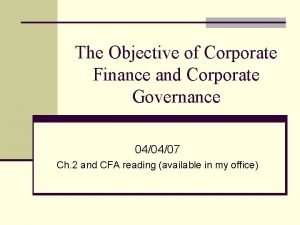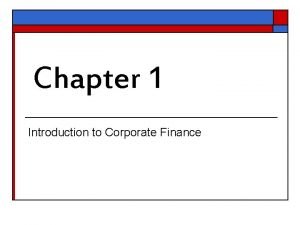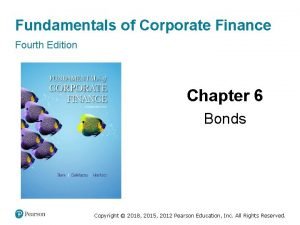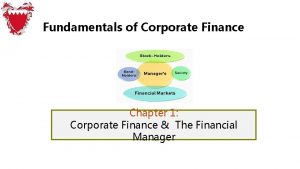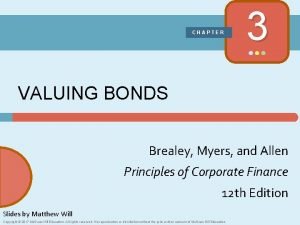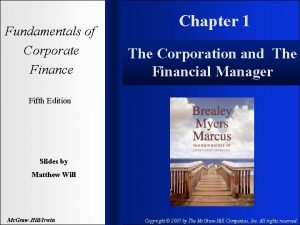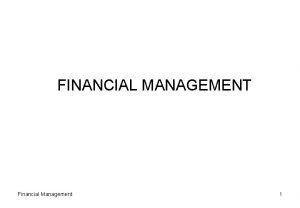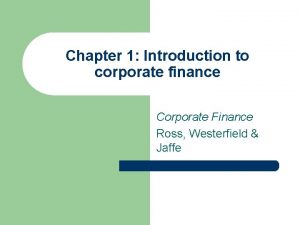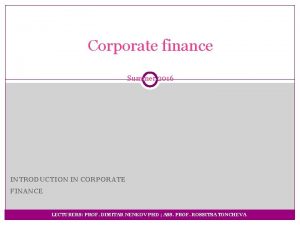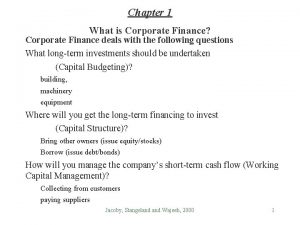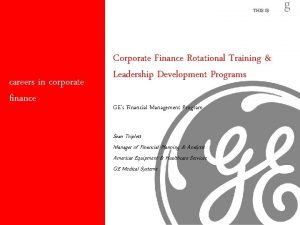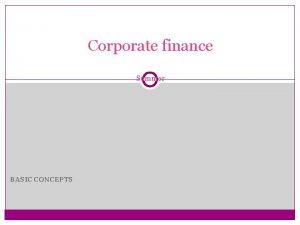CHAPTER 1 Introduction to Corporate Finance 0 Outline











- Slides: 11

CHAPTER 1 Introduction to Corporate Finance 0

Outline What is Corporate Finance? The Role of Financial Managers Goals of the Corporate Firm 1

What is Corporate Finance? 1. What long-term investments should the firm engage in? (Investment Policy) 2. How can the firm raise the money for the required investments? (Financing Policy) 3. Should firm decide to distribute or re-invest? (Dividend Policy) 4. How much short-term cash flow does a company need to pay its bills? (working capital and short term financing) 2

The role of financial manager— Create value for firm 1. 2. Execute good investment policy (High asset returns) Execute good financing policy (low cost of capital) 3

The objective of corporate managers n The objective of managers should be pursuing the maximization of the shareholders’ wealth (share price). 4

Why they are not corporate objectives? Maximization of earnings n Maximization of sales n Maximization of market share n 5

Separation of Ownership and Control Board of Directors Assets Equity Shareholders Debtholders Management 6

Do managers really maximizing stockholders’ wealth? n Managers mostly are doing in accordance with their job specifications, that is maximizing stockholders’ wealth. But recently we find evidence that they might pursue their personal goals in the expense of the firm (shareholders). 7

Managers’ personal goals Managers’ interest might conflict with firm's interest ¨Expensive perks (large office and expensive cars) ¨Managers’ job security and payoff n Managers tend to pursue high growth in assets (relates to their payoff), which might not be the best interest for shareholders. n 8

Contracting and Monitoring are served to reduce agency conflicts n The managers will usually act in the shareholders’ interests. ¨ The shareholders can devise contracts that align the incentives of the managers with the goals of the shareholders. ¨ The shareholders can monitor the managers behavior via outside auditing services. n Contracting and Monitoring device are costly. 9

Managerial talent market serves as outside force to double check managers behavior n n n There is a market for managerial talent—this may provide market discipline to the managers—they can be replaced. Managers will strive for better performance for the better price of next contract; or when they decide to transfer for a better position otherwise. If the managers fail to maximize share price, they may be replaced in a hostile takeover. 10
 Objective of corporate governance
Objective of corporate governance Introduction to corporate finance what companies do
Introduction to corporate finance what companies do Chapter 1 introduction to corporate finance
Chapter 1 introduction to corporate finance Chapter 1 introduction to corporate finance
Chapter 1 introduction to corporate finance Chapter 1 introduction to corporate finance
Chapter 1 introduction to corporate finance Nisan langberg
Nisan langberg Bottom up beta formula
Bottom up beta formula Fundamentals of corporate finance chapter 6 solutions
Fundamentals of corporate finance chapter 6 solutions Fundamentals of corporate finance, chapter 1
Fundamentals of corporate finance, chapter 1 Principles of corporate finance chapter 3 solutions
Principles of corporate finance chapter 3 solutions Fundamentals of corporate finance, chapter 1
Fundamentals of corporate finance, chapter 1 Financial management theory
Financial management theory
